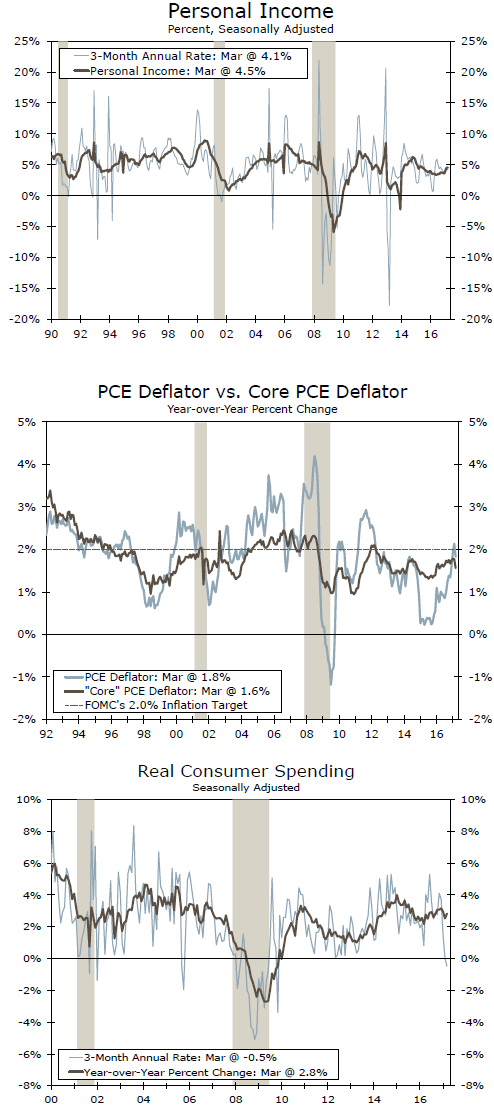Negative inflation in the last month of the quarter helped personal income and spending recover after very weak readings in the first two months of 2017. Real personal consumption increased 0.3 percent in March.
Inflation Takes the Pressure Off the U.S. Consumer in March
Higher inflation kept the U.S. consumer in check during the first two months of the quarter as real personal consumption expenditures dropped 0.3 percent and 0.1 percent. However, the easing of inflation in the third month of the year helped personal consumption expenditures (PCE) to come in positive during the quarter as we saw last week with the release of first quarter results. Personal consumption expenditures, while flat in nominal terms in March, rose 0.3 percent in real terms after accounting for inflation. The PCE deflator was down 0.2 percent during the last month of the first quarter, while the core PCE was down 0.1 percent.
Still, goods consumption was very weak in March while services consumption was strong. Durable goods consumption was down $19.6 billion, while non-durable goods consumption was down $8.7 billion. However, services consumption was very strong, increasing $34.0 billion in March and helping overall PCE during the month. Services consumption was very weak during the first two months of the quarter, increasing only $8.3 billion and $3.2 billion in January and February, respectively.
The 0.3 percent increase in real PCE was due to a 0.1 percent drop in goods consumption, which was caused by a 0.7 percent decline in durable goods consumption. Meanwhile, services consumption improved by a strong 0.4 percent after declining 0.1 percent and 0.2 percent in January and February, respectively.
Personal Income Mixed in March
Although consumption remained weak during the first quarter of the year income continued to advance. Nominal personal income increased 0.2 percent during the last month of the quarter after a 0.4 percent increase in January and a 0.3 percent increase in February. Nominal disposable personal income also increased 0.2 percent in the last month of the quarter. However, real disposable personal income surged 0.5 percent in March due to the weak inflation print for the month.
However, compensation of employees weakened considerably in March compared to the previous months. Compensation of employees increased only $8.1 billion in March, compared to an increase of $42.5 billion and $45.9 billion in January and February, respectively.
Better Times Ahead for Consumption
The March numbers may be pointing to an improvement in the second quarter of the year for the U.S. economy, especially from the consumer side. If that is the case, consumer demand will be more in tune with the improvement in consumer confidence data we have seen since the presidential election last November.

